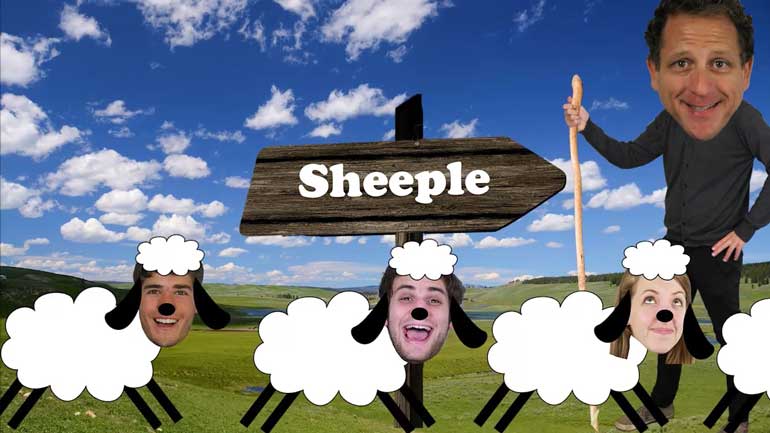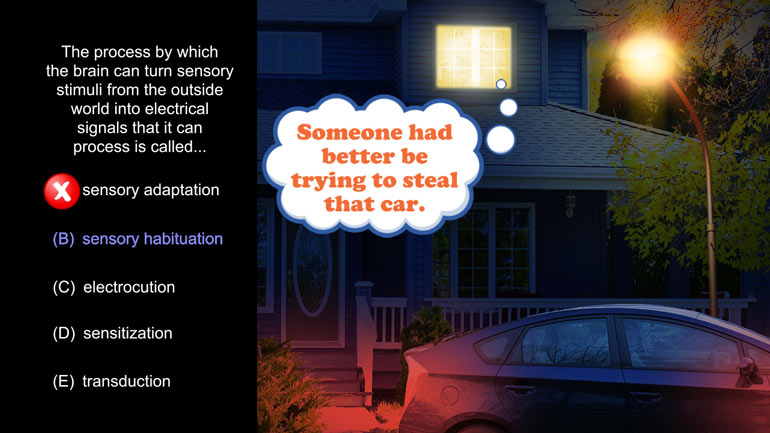ShmoopTube
Where Monty Python meets your 10th grade teacher.
Search Thousands of Shmoop Videos
AP Psychology 2.4 Developmental Psychology 9 Views
Share It!
Description:
AP Psychology 2.4 Developmental Psychology. What was Erik Erikson's rebuttal to Sigmund Freud's developmental views?
Transcript
- 00:05
Here's your shmoop du jour brought to you by Eric Erickson a
- 00:08
developmental psychologist known for coining the term identity crisis which [Erik Erikson and license of Erik appears]
- 00:13
given his name is probably something he never went through..Okay here's question
- 00:18
what was Erik Erikson's rebuttal to Sigmund Freud's development views and
- 00:22
here are our potential answers.... All right
Full Transcript
- 00:29
well unlike Freud, Erickson didn't talk about psychosexual stages he discussed
- 00:34
psychosocial stages maybe this was because unlike Freud, Erickson felt [People walking in a supermarket]
- 00:39
people were highly influenced not by their urges and desires but instead by
- 00:44
their interactions with others we like that idea better too actually.. Okay well
- 00:49
nonetheless while Freud developed five psychosexual stages Erickson proposed [A book of Freud's 5 psychosexual stages]
- 00:53
eight psychosocial stages meaning A) doesn't fit and that Erickson was a
- 00:59
show-off what five wasn't good enough yeah anyway Erickson believed a crisis [Crisis ahead road sign]
- 01:04
occurred at each stage of development and that each described a psychological
- 01:08
need of the individual conflicting with the needs of society by completing one [Man jumps over a hurdle]
- 01:12
stage the individual moves on to the next one developing a healthy
- 01:16
personality as they go because of this C) doesn't fit either Erickson described
- 01:21
each stage as teaching a basic virtue and while each stage generally comes [Clock ticking for each stage]
- 01:26
around the same time for every person. Erickson felt that some could be
- 01:29
temporarily bypassed and returned to later in life hopefully one of those stages [Baby with a man's face]
- 01:34
isn't potty training for you but just to be sure let's take a look at the eight
- 01:39
stages here as you can see each stage of life brings forth a new psychosocial [Examples of the 8 psychosocial stages]
- 01:44
conflict each resulting in the learning of a new virtue resulting in a healthy
- 01:49
personality and as you can see number six involves intimacy and love meaning D)
- 01:54
is incorrect either although it definitely says something about how much [Man abseiling into a cave of the list city of love]
- 01:57
of a pain in the butt discovering love can be according to Erickson it takes
- 02:01
only two years to find purpose in life but over 20 years to fully learn about [Guys in a car dancing to music]
- 02:06
love which is probably why the adults you know are so blase about it and
- 02:10
latency is a psychosexual stage of Freud's.. Not
- 02:13
a psychosocial stage of Erickson so E) doesn't fit either that leaves us with B)
- 02:18
which were fairly sure we mentioned at the very beginning of this video but..
- 02:22
maybe not we were busy buying 22 jars of pickles... we might [Man buying 22 jars of pickles at cashier]
- 02:28
need some new friends their people anybody volunteer?
Up Next
AP Psychology 2.2 Social Psychology. Which of the following was an independent variable manipulated in Asch's research?
Related Videos
AP Psychology 1.1 Personality. According to Freud, these three parts of personality are constantly in conflict.
AP Psychology 1.1 Sensation and Perception. The process by which the brain can turn sensory stimuli from the outside world into electrical signals...
AP Psychology 1.1 Social Psychology. Which of the following best describes social psychology?
AP Psychology 1.1 States of Consciousness. Who conducted research on REM sleep deprivations?




